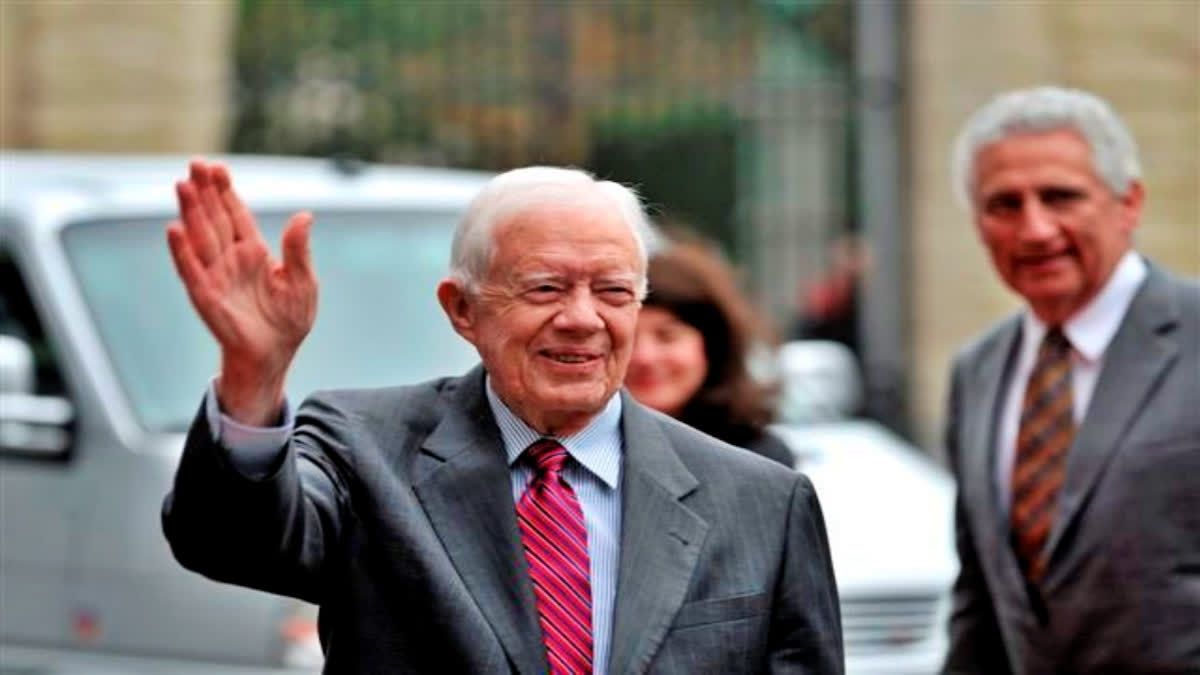Plains (Georgia): Jimmy Carter already had drawn months of media scrutiny as a devout Southern Baptist running for president. Then the 1976 Democratic nominee brought up sex and sin as he explained his religious faith to Playboy magazine. Carter was not misquoted. But he was certainly misunderstood, as his thoughts in the wide-ranging interview were reduced in the popular imagination to utterances about lust and adultery.
Nearly a half-century later, as the 98-year-old Carter receives hospice care in the same south-Georgia home where he once spoke with Playboy journalists, interviewer Robert Scheer still believes Carter was treated unfairly. He recalls the former president as a real and serious figure whose intent was smothered by the intensity of a campaign's closing stretch.
Jimmy Carter was a thoughtful guy, Scheer, now 87, told The Associated Press. But that got lost here. I've never seen a story like it. It was worldwide... It just never went away. Political disaster ensued. Rosalynn Carter was suddenly being asked whether she trusted her husband. The fallout, in Carter's words, nearly cost me the election.
Carter spent five-plus hours with Playboy across several months more time with you than with Time, Newsweek and all the others combined, the nominee told Scheer and Playboy editor Barry Golson. The resulting Q&A spanned 12,000 words, and Scheer added thousands more in an accompanying story. Carter discussed military and foreign policy, racism and civil rights, political journalism and his reputation as a vague candidate. They weren't interested in sensationalised stuff, Scheer said of Playboy.
Hugh Hefner's iconic publication reached an estimated 20 million-plus readers each month with its pictorials of nude women. But the magazine chronicled American culture as well, with its branded Playboy Interview featuring such power players as the Rev Martin Luther King Jr, John Lennon, Malcom X and leading newsman Walter Cronkite. Carter, unafraid of nuance, proved he belonged among them, Scheer said.
The nominee's most-remembered comments came at the end of their final session. Standing outside Carter's front door, Golson pressed Carter on whether his piety would make him a rigid, unbending president unable to represent all Americans. The Baptist deacon responded with an 823-word soliloquy on human imperfection, pride and God's forgiveness. He said he believed in absolute and total separation of church and state and explained his faith as rooted in humility, not judgment of others.
Quoting Matthew 5:27-28, Carter explained that Jesus Christ considered an offending thought equivalent to consummated adultery, and by that standard, he was in no position to judge a man who shacks up and screws lots of women, because he had looked on many women with lust and, thus, committed adultery many times in my heart. Scheer called it a sensible statement, reflecting Carter's Baptist tradition: He was saying, look, I'm not going to be some fanatic. ... I'm not this perfect guy.
Playboy realised Carter provided explosive material and not just about sex. Citing President Lyndon Johnson's handling of Vietnam, Carter included the last Democratic president alongside disgraced Republican Richard Nixon as guilty of lying, cheating and distorting the truth. The magazine decided to send the full Q&A text to about 1,000 media outlets in late September, ahead of the usual October publication date for the November edition.
The idea, Scheer explained, was to allow time for fair coverage rather than drop bombshells days before the election. Headline writers, satirists and late-night television pounced anyway, labelling it Carter's lust in my heart interview. Saturday Night Live, then a fledgling NBC sketch comedy show, had a field day. One political cartoonist depicted Carter lusting after the Statue of Liberty. He lamented to NPR in 1993 that the Playboy interview morphed into the No. 1 story of the entire 1976 campaign.
I was explaining Jesus' Sermon on the Mount, Carter wrote wistfully in a 2015 memoir. As a candidate, Carter's faith had endeared him to many fellow white evangelicals and cultural conservatives. That made him a difficult foil for Republicans, who wanted to cast Democrats as out-of-step with most of America. The flip side, Scheer noted, was the many young voters and urban liberals key Democratic constituencies who wondered if he was this Southern square.
Hamilton Jordan (Carter's campaign manager) had always called Carter's faith the weirdo factor,' said media historian Amber Roessner, a University of Tennessee professor who has written extensively on Carter. Talking to Playboy was their way to prove he wasn't some kind of prude. Scheer, who was with Carter as part of his travelling press corps, said Playboy's early text release sparked a frenzy. Reporters were scrambling, asking me, Bob, what is this? he recalled.
Travelling press focused initially on Carter's criticism of Johnson, who had died in 1973. It was a juicy detail because Carter was headed Texas to campaign with Johnson's widow. Carter initially told reporters he was taken out of context. Scheer ran back to the plane to get the tapes, and effectively caught the nominee violating his pledge never to make a misleading statement.
Lady Bird Johnson skipped Carter's Texas events, Scheer said. Carter apologised to her by telephone. When his commentary on adultery ballooned, Carter insisted the exchange had been off-the-record, throwaway banter as Scheer and Golson prepared to leave. He was still wearing the mic! Scheer told AP. The way the story morphed ended up making Carter seem like a creep, Roessner said.
Rosalynn Carter fashioned a pat response: Jimmy talks too much, but at least people know he's honest and doesn't mind answering questions. And, no, she never worried about his fidelity. The only lust I worried about was that of the press, she wrote in 1984, recounting how her discipline finally cracked when a reporter asked whether she ever committed adultery. If I had, she replied, I wouldn't tell you. (AP)



